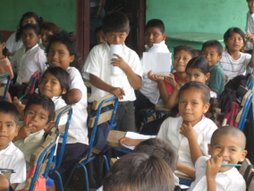Charity, philanthropy, sustainability, community development, empowerment...Sometimes a difference in words seems to be only that, a difference in words, but after living in one of the poorest nations in the Western hemisphere where there are organizations galore wanting to address the poverty, I can't help but think that there are important distinctions in words and actions that make a huge difference in the lives of the very people that so many people in other places want to help.
Sometimes when I talk to friends and family about Opportunity International (where I'm working now), I feel like a broken record because I feel so passionate about the organization and the work that it's doing, especially here in Nicaragua. As with any job, it's not perfect and I often feel overwhelmed or insecure, but no matter how tired I feel at the end of the day, I always leave feeling in awe of the mission and the accomplishments so far. The way the organization overall attempts to "transform the lives of people in poverty" (the mission statement) is by giving micro loans to people who want to start or enhance a business. Microfinance is well-known these days; what's not as well known is that while microfinance helps people in poverty become stable, it's not actually helping much to move the poorest-of-the-poor out of poverty.
What's cool about what Opportunity International is doing in Nicaragua is that another layer of community economic development is being added, with the idea that if communities learn to work together and develop leadership/group management skills and put in plan great ideas, communities will start to move out of poverty. The reason I got involved with the library project is that a community applied for a loan to start a library, but had no experience with libraries in general, let alone managing a system of control, volunteer librarians, or accessing books. Although I am not a librarian, I have access to research tools such as the internet and educators, and thus helped develop training materials on how to create a library, in the most simplified form possible. The library is now up and running, and other communities are interested in receiving a loan to start a library. Since Opportunity has to think about sustainability, our idea is to form a network of community-owned libraries so that they can access books for really cheap prices, network with each other and already existing libraries, be treated as professionals, attend conferences, (details to follow as I am currently trying to write the policy). The great part is, EVERYTHING is community-initiated. If no other communities apply to create a library because they have other great ideas, my job will not be as applicable and I'll turn to something else where I can be of assistance or be out of a job (which wouldn't be too bad since I leave fairly soon.)
When I first was talking to Geralyn, the director of Opportunity here in Nicaragua and a strong woman who I highly respect, she told me that when she first started talking to clients in poor communities asking what they thought their communities needed, not one person thought of their own skills and talents. Instead, she heard "we need Habitat for Humanity, World Vision, Save the Children, UNICEF, (you name the organization)" to come help us. I'm not trying to put down any of those organizations, but what was striking is how dependent-sounding these communities were. So many organizations are deficit-based: children lack education, clothes, jobs food, parents don't have resources. The solution is to then fill those needs: provide education, jobs, clothes, food, resources. What if all these organizations became asset-based and focused on the skills that these communities do have? The children may lack education, but maybe they have dedicated parents who want to create a library; people may lack professional skills but are able to do construction work, run a micro business, fill out a loan. Let people come to the table with their abilities, and then provide training to help them reach a next level. Every single person I know has skills and then also has the potential to develop their skills, regardless of whether they have a Ph.D. or did not finish elementary school. Geralyn told me the key to community development work is to "never do for someone what they can do for themselves." The thing is, though, it's hard work. Sometimes really hard work.
Phew, kudos to those of you who made it through that. Why I don't like charity is that it seems to create a dependency, an "us vs. them" mentality. Maybe it's just a difference in words, but I really don't think so.
Suscribirse a:
Enviar comentarios (Atom)

1 comentario:
Hi there.. I just had an argument with my housemate echoing many of the points you made in your blog..
I think you should (if you haven't already) watch a movie called zeitgeist addendum. You can watch it free on zeitgeistmovie.com. It's a highly controversial movie about how we should move to a resource based economy and do away with money.
Good luck.
pete@petepamf.com
Publicar un comentario